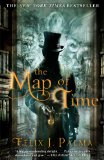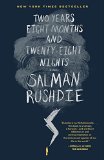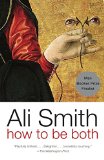Summary | Excerpt | Reviews | Beyond the book | Read-Alikes | Genres & Themes | Author Bio

A Novel
by Felix J. PalmaReading literature in translation feels like being let in on a secret that other people the world over already know. It used to be that "Literature in Translation" was reserved for Big, Important Books - Nobel-prize winning authors, classics originally written in Russian or French. But more recently, with the rise in popularity of international books, like the many crime novels set in Scandinavian countries, or children's fantasy novels such as those by Cornelia Funke or Antonia Michaelis, the English speaking world is finally starting to figure it out - people the world over appreciate, and write, darn good stories in a variety of genres. Félix J. Palma's The Map of Time, originally published in Spain in 2008, is now available in English, and readers will be thrilled to discover this "secret" treasure, already beloved in Europe.
Like the time machine at the center of Palma's story, his novel transports readers to an evocative, fully realized time and place - London in the late nineteenth century. There we meet a variety of characters, both imaginary and real: Henry James, Jack the Ripper, the Elephant Man, and, most importantly, H. G. Wells, the author of such novels as The Island of Dr. Moreau and The Time Machine (see "Beyond the Book"). Not surprisingly, as Palma is revered as a master of the short story form, this hefty novel is more or less three separate narratives, linked primarily by the character of H. G. Wells and, more thematically, by the topic of time travel.
In the first story, a despondent young man longs to travel back in time to save his beloved from a gruesome fate. In the second, an independent, headstrong Victorian woman falls head over heels in love with a man from the year 2000. And in the final episode, H. G. Wells himself must investigate how to save the future of literature - including his own work, The Invisible Man. In every case, Palma cleverly illustrates how little is as it seems, championing the power of imagination even as he creates a world firmly grounded in rich historical detail.
Palma is clearly an accomplished storyteller - the novel's fast pacing, imaginative exploits, and unexpected twists and turns make each story a fascinating piece in its own right; combined, the work is both an utterly perfect summer read and an extended meditation on the permeability of time and the limitations of technology, as seen through the lens of the Victorian age.
Palma's narrator is sophisticated, an amalgamation of Dickensian omniscience and the knowing wink of postmodernism. He often steps outside the action to comment on it, and on his own narrative techniques. The result is a playful storytelling method that nevertheless feels true to its historical roots.
A darkly sweeping epic set in the often grim and hidden back streets of nineteenth century London might not seem like an obvious beach read. But The Map of Time, with its deep romanticism and lush storytelling - not to mention its air of shadowy fantasy - will appeal to readers who like a little magic and mystery with their sun and sand.
Watch for Palma's next novel, The Map of the Sky - a novel that again casts H.G. Wells in a leading role as the extraterrestrial invasion featured in The War of the Worlds turns into a bizarre reality - coming in hardcover, September 2012.
![]() This review was originally published in The BookBrowse Review in August 2011, and has been updated for the
June 2012 edition.
Click here to go to this issue.
This review was originally published in The BookBrowse Review in August 2011, and has been updated for the
June 2012 edition.
Click here to go to this issue.

If you liked The Map of Time, try these:

Two Years Eight Months and Twenty-Eight Nights
by Salman Rushdie
Published 2016
From Salman Rushdie, one of the great writers of our time, comes a spellbinding work of fiction that blends history, mythology, and a timeless love story. A lush, richly layered novel in which our world has been plunged into an age of unreason, Two Years Eight Months and Twenty-Eight Nights is a breathtaking achievement and an enduring testament to...

by Ali Smith
Published 2015
Two tales of love and injustice twist into a singular yarn where time gets timeless, structural gets playful, knowing gets mysterious, fictional gets real—and all life's givens get given a second chance.
Fanaticism consists in redoubling your effort when you have forgotten your aim
Click Here to find out who said this, as well as discovering other famous literary quotes!
Your guide toexceptional books
BookBrowse seeks out and recommends the best in contemporary fiction and nonfiction—books that not only engage and entertain but also deepen our understanding of ourselves and the world around us.